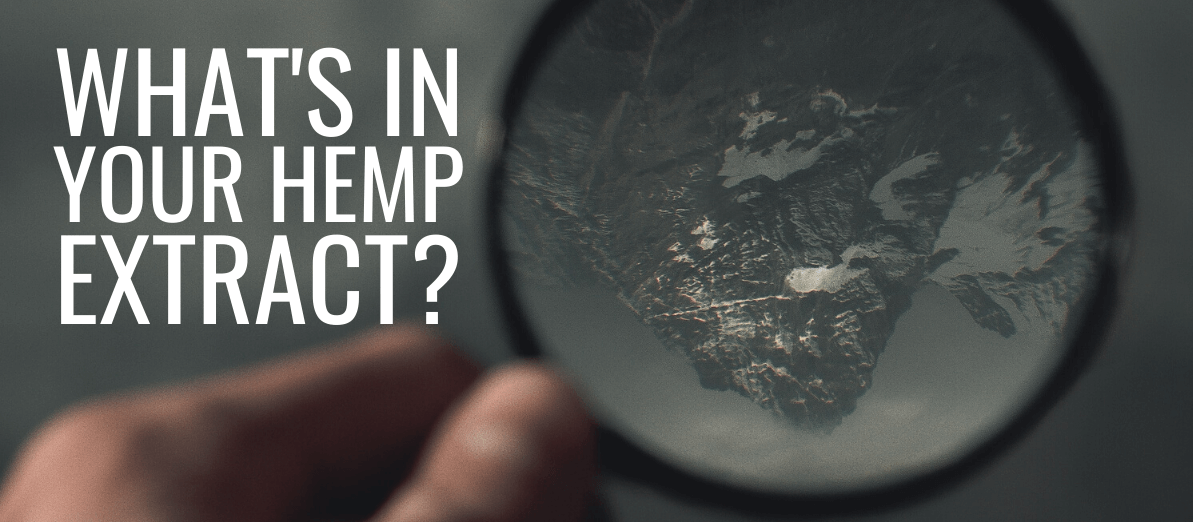You hear the term “hemp extract” thrown around a lot in reference to CBD these days. It’s not that surprising when you consider that, to many cannabidiol consumers, CBD and hemp extract are as synonymous as peanut butter and jelly. While many of us have a cursory, somewhat vague understanding of what the term “hemp extract” actually refers to, it is still important that avid, dedicated CBD consumers know exactly how to define it. They should know what is in the hemp extract they’re consuming.
What Is Hemp Extract?
Hemp oil extract is but one of hundreds of compounds that can be derived from what we commonly refer to as the cannabis plant. Hemp, obviously, has been around for centuries, and serves a much greater purpose beyond the fairly straightforward act of hemp oil extraction. As most of you know, hemp can be put to fine practical use when it comes to textiles, cooking and other interesting products. These days, hemp – especially in the form of hemp oil – is used in everything from lotions to tinctures to edible products. There is also the relationship between hemp and cannabinoids to consider. This is particularly true when it comes to the naturally-occurring cannabinoids that are present in your body as a result of the endocannabinoid system: a series of cannabinoid receptors located throughout your body that’s more commonly referred to by its medical acronym, the ECS.
Hemp extract itself is a kind of oil, but it’s not exactly the same thing as hemp oil. Typically, hemp extract is derived from the stalks of hemp plants, which are often grown in industrial settings such as labs. The oil that is derived as a result of the extraction process is of great value when it comes to marketing and manufacturing CBD products. Hemp oil has always had a wide variety of purposes, and can be used in a number of different, dynamic ways today.
Hemp Extract Oil Vs. Hemp Seed Oil
Some hemp seed oil rarely contains phytocannabinoids, although they are rich in other nutrients. Hemp oil and hemp extract CAN contain CBD, but hemp seed oil, by itself, does not always contain it. It is important to note that hemp seed oil and hemp oil extract are NOT the same thing, although one could not be faulted for thinking that they were. If you study the language of both terms, you could probably identify the difference.
As we mentioned, the types of hemp plants that typically have oil extracted from them are what are called “industrial plants.” Industrial plants are typically non-psychoactive in terms of their inherent chemical properties, yielding extract that contains less than 0.3% THC. Every component of an industrial hemp plant has a use – the stalks, the seeds, the oil – and, being flush in proteins and nutritious fatty acids, the industrial hemp plant is often a more viable, renewable, green-friendly alternative to other cannabis-adjacent options that are also on the market.
Full spectrum hemp extract generally contains many of the ingredients that are present in the industrial hemp plant itself. There are also various isolates that one must deal with as a result of the hemp extraction process. Isolates are generally higher in their cannabidiol count than either full spectrum of broad spectrum extracts, and are known to contain next to no THC.
Components Of A Hemp Extract
It is safe to say that hemp extract and CBD oil are more or less analogous. Typically, hemp extract is mined from the parts of the cannabis plant that are known to have particularly high CBD levels.
Cannabidiol is considered the second most prominent chemical particle that can be found in cannabis, the most prominent being tetrahydrocannabinol, more commonly referred to as THC. Generally speaking, hemp extract itself contains very little of this aforementioned substance (THC), which is why you can’t catch a buzz from any CBD products that can be easily purchased online. There is a greater volume of CBD present in hemp extract, as well as an array of additional interesting cannabinoids such as CBG, CBN and CBDA.
Your hemp extract contains much more than just CBD. In addition to the cannabinoids already mentioned, there are countless other compounds that travel from the hemp plant to a CBD hemp extract that offer their unique characteristics. You also get to enjoy a host of terpenes in your extract, which give it the taste and scent that you’ve come to appreciate. While CBD might be the most prominent compound that you consume, there are many others there with it, working together to produce an “entourage effect” of sorts and allow you to enjoy a fuller hemp experience.
What’s In Your Extract?
So, how do you know what’s in the hemp extract in the product you’ve just bought? The great thing about the cannabidiol industry is that every CBD item you purchase comes with a detailed lab report that will give you the low-down on the ingredients contained in said product. Once you familiarize yourself with the terminology and science contained in these lab reports, there will no longer be any mystery as to what you’re consuming, or whether or not it’s good for your body.
We hope that you’ve enjoyed our brief primer on hemp extract.



